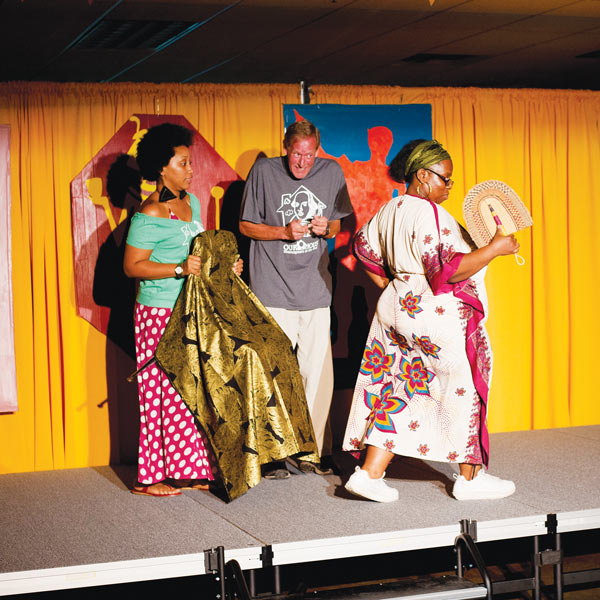Our House, a shelter for the working homeless on Roosevelt Road that houses approximately 120 people on any given night, hosted its third annual Shakespeare at the Shelter program Friday and Saturday night, with residents and alumni performing a collection of brief monologues and other bits from “Othello,” “Julius Caesar,” “Antony and Cleopatra,” “The Comedy of Errors” and “A Midsummer Night’s Dream.” The two showings marked the culmination of a summer-long Shakespeare educational experience for a group of about 10 residents.
The program began in June with an Introduction to Shakespeare workshop run by Roslyn Knutson, retired professor of Shakespeare at UALR. In late June, residents and volunteers attended a production of “The Two Gentlemen of Verona” at the Argenta branch of the William F. Laman Public Library.After that show, residents who remained interested in the program determined roles that would suit them with the help of the program’s producer, Joy Ritchey, and director Ganelle Holman.“We don’t turn anybody away, and there’s no audition process,” said Ritchey, who also serves as the shelter’s grants manager. “We work with each resident to figure out what part they should be. Some residents know what they want to do, but others don’t, and we help them explore that.”They rehearsed every Sunday from 4 to 6 p.m. for almost two full months until last week’s production. The brunt of the work for the cast, Ritchey said, was in learning the early modern language, getting the jokes and memorizing the lines. Many cast members practiced their lines outside of that Sunday window. Resident Kevin Kirkpatrick, for example, who hosted the show with fellow resident Richard Taylor, said he would practice with Taylor around the shelter whenever the two found each other during a free minute. Ritchey also discussed the way the production accommodates the often-transient nature of homelessness.
“People do drop out,” she said. “But we’re able to accommodate that based on the way we have it set up — that’s why we do it in a series of monologues. If somebody disappears in the middle of the [program], we can still have a show. Usually by the time we’re a month out from the show, we have a core group.”
Our House resident Crystal Cresanto, who played Puck, actually dropped in. She arrived at the shelter in July, a month into the two-month rehearsal process. She took a job at the Little Learners Child Development Center, which provides programming for the children of shelter residents. While the children slept, she would practice her lines to the tune of soft music.
“I played classical music in the background,” she said. “They say that if you play classical music while you’re trying to study or learning lines, it stimulates brain cells in the back. I’ve done that for my son to get him to do his homework.”
In the week before production, the residents rehearsed twice, the stage was set, lights and ceiling-flag decorations went up, and more than 50 chairs were positioned. By the time the Saturday night production rolled around, the intake room, where the show took place, could accommodate standing room only, and barely that. Ritchey said the room was chosen intentionally.
“It’s the first place people come when they come into the shelter,” she said. “It’s where they do all their paperwork and have all their bags searched. It’s a place where people are often having a dark moment. We try to make that as soft a landing as possible, but often it’s a difficult moment.”
Shakespeare at the Shelter, she said, makes that room a space of hope and creative expression. Ritchey also said that while she considered hosting the program in the new, $5 million children’s center, she decided instead that this was an opportunity to draw in the community to witness a group of people who are often overlooked: “single, homeless adults.”
“Being in that physical space matters because it’s where people live,” Ritchey said. “People who’ve never seen a shelter before, even well-meaning people who have compassion but who might be scared to come on Roosevelt — we can kind of lure them in with this program. Then the stigma goes away, and then they want to come serve a dinner or take a tour.”
And the show went off without a hitch. Kirkpatrick and Taylor earned various rounds of applause for their repartee and wit as co-hosts. Other players included Hastings Bransford, Herbert Denson, Michelle Evans, Ashley Shaw, Mary Shue, Kelly Lopez, Crystal Mercer and Cresanto.
“I just had a ball,” Cresanto said, who ended the show with Puck’s famous monologue, “If we shadows have offended —” “Because I knew I could close it out with a bang,” she said.
The performance earned a standing ovation from the crowd, and after the lights went up, cast members sat on the stage and fielded questions from the audience about the show, about life in the shelter and about homelessness in general.
Denson, who played Mark Antony in “Julius Caesar,” joked that he “should have been on bloopers” because he forgot his lines during Thursday’s rehearsal. His Saturday night showing, however, was flawless.
“It really sparked a love I have for theater,” Bransford said. He played a very convincing Nick Bottom, the ass in “A Midsummer Night’s Dream” whose song enchants the fairy queen Titania.
Kirkpatrick, a U.S. Army veteran who fought in Afghanistan, echoed a similar sentiment.
“This play has really given me an opportunity to reach out to everybody else, to pay back to the shelter something that they’ve done for me, and to decompress,” he said. “And that can be very important.”
Cresanto said that in the process of studying the character of Robin Goodfellow, both through her own monologue and through Mickey Rooney’s 1935 film depiction of the character, she found a person she might’ve been surprised to discover: herself.
“Playing Puck, I was mysterious, quiet and troubled, and it kind of blended everything to show everybody that even though I had a troubled past, this is me,” she said. “I could overcome anything.”

